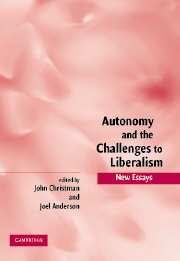Book contents
- Frontmatter
- Contents
- Contributors
- Preface
- Autonomy and the Challenges to Liberalism
- 1 Introduction
- PART I THE SELF: CONCEPTIONS OF THE AUTONOMOUS SELF
- PART II THE INTERPERSONAL: PERSONAL AUTHORITY AND INTERPERSONAL RECOGNITION
- PART III THE SOCIAL: PUBLIC POLICY AND LIBERAL PRINCIPLES
- PART IV THE POLITICAL: LIBERALISM, LEGITIMACY, AND PUBLIC REASON
- 11 Liberalism without Agreement: Political Autonomy and Agonistic Citizenship
- 12 The Place of Autonomy within Liberalism
- 13 Moral Autonomy and Personal Autonomy
- 14 Autonomy, Self-Knowledge, and Liberal Legitimacy
- Bibliography
- Index
11 - Liberalism without Agreement: Political Autonomy and Agonistic Citizenship
Published online by Cambridge University Press: 02 December 2009
- Frontmatter
- Contents
- Contributors
- Preface
- Autonomy and the Challenges to Liberalism
- 1 Introduction
- PART I THE SELF: CONCEPTIONS OF THE AUTONOMOUS SELF
- PART II THE INTERPERSONAL: PERSONAL AUTHORITY AND INTERPERSONAL RECOGNITION
- PART III THE SOCIAL: PUBLIC POLICY AND LIBERAL PRINCIPLES
- PART IV THE POLITICAL: LIBERALISM, LEGITIMACY, AND PUBLIC REASON
- 11 Liberalism without Agreement: Political Autonomy and Agonistic Citizenship
- 12 The Place of Autonomy within Liberalism
- 13 Moral Autonomy and Personal Autonomy
- 14 Autonomy, Self-Knowledge, and Liberal Legitimacy
- Bibliography
- Index
Summary
In recent years, liberal political theory has been revolutionized in a number of ways. First, initiated by John Rawls, mainstream liberalism has dropped its self-understanding as a comprehensive moral in favor of a purely political self-understanding. Second, several authors have started criticizing this now widespread “political” self-understanding of liberalism in a number of ways. Some claim that liberalism is not a purely political doctrine at all. Others argue that, irrespective of the question whether it is or is not, it cannot claim to be based in the hypothetical agreement of all reasonable citizens. As Marilyn Friedman puts it: “ … political liberalism is simply one more political doctrine among many, freestanding or not, with no greater politically independent, consent-based claim to anyone's allegiance than many of its political rivals.”
Of course, it is not at all clear that this conclusion is warranted. But suppose it is. And further suppose that in a pluralistic social world, ongoing interpretative conflicts over the requirements of a just and well-ordered society, its constitutional essentials, and its principles of justice are more characteristic of political cooperation than fundamental agreements as to these requirements are. We then arrive at a starting point for normative political theory that is strikingly different from that of political liberalism. For our main question would no longer be: which substantive agreements among reasonable citizens would help warrant political legitimacy, and appropriate understandings of political autonomy and civic responsibility?
- Type
- Chapter
- Information
- Autonomy and the Challenges to LiberalismNew Essays, pp. 245 - 271Publisher: Cambridge University PressPrint publication year: 2005
- 3
- Cited by

